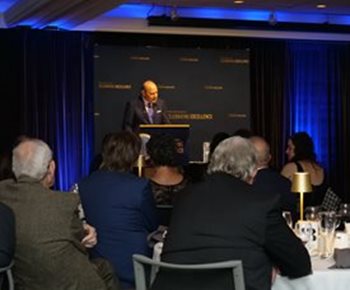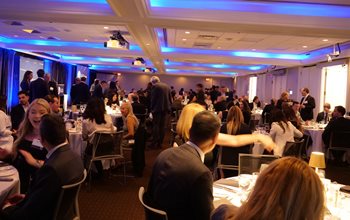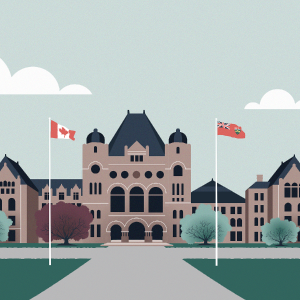Winner of the 2025 OBA Award of Excellence in Alternative Dispute Resolution reflects on a career dedicated to healing and resolution
To open this newsletter season, we are delighted to feature an inspiring conversation with Jay Rudolph, the recipient of the 2025 OBA Award of Excellence in ADR. Jay’s work and reputation in the field of mediation have long earned him the respect of colleagues, clients, and peers across the profession. I had the honour of sitting down with Jay to talk about his practice, his aspirations, and moments of reflection that reveal both nostalgia and gratitude. Our discussion offered a window into the thoughtful and grounded approach that has defined his career and the deep sense of purpose that continues to guide his work.
recipient of the 2025 OBA Award of Excellence in ADR. Jay’s work and reputation in the field of mediation have long earned him the respect of colleagues, clients, and peers across the profession. I had the honour of sitting down with Jay to talk about his practice, his aspirations, and moments of reflection that reveal both nostalgia and gratitude. Our discussion offered a window into the thoughtful and grounded approach that has defined his career and the deep sense of purpose that continues to guide his work.
That sense of purpose is rooted in both experience and gratitude. Even after 32 years as a mediator, Jay still remembers the moment that he launched his career. It was November 1993 when Cliff Hendler, a founding figure of mediation in Ontario, called him about a case. Over lunch, Hendler gave the newly trained mediator his first opportunity, a chance that would shape the next three decades of Jay's professional life. "I definitely am extremely grateful to Cliff Hendler for giving me that opportunity and encouraging me and mentoring me," Jay recalls. "I will forever be grateful to him." That gratitude has become a cornerstone of Jay's philosophy as he receives the 2025 OBA Award of Excellence in ADR, the most significant honour of his career, he says.
Path to mediation
Jay's path to mediation wasn't planned from the start. After articling at mid-sized Toronto firm Shibley Righton, he spent 12 years doing both insurance defence work and plaintiff personal injury cases, an unusual combination that gave him a valuable perspective. "I could see both sides," he explains. "I was seen as being a reasonable lawyer, defence and plaintiff, and I loved negotiating." As a ten-year lawyer doing both sides of the bar, Jay took mediation training and attended the Harvard Negotiation Workshop, an experience he describes as transformative. "The mediation training was great and gave me the process of mediation, but the negotiation workshop really enhanced my knowledge of how to analyze and approach any negotiation."
In 1995, he made the conscious decision to leave the firm and open his own practice, building up his mediation work to avoid conflicts. The transition took time, but by the early 2000s, mediation had become his primary focus. It was a deliberate choice, one that would allow him to dedicate himself entirely to the work he found most meaningful, helping parties find resolution and, sometimes, healing.
Some cases stay with a mediator forever. Jay speaks quietly but powerfully of a mediation involving a 16-year-old boy who died during a routine root canal after suffering a seizure. Despite significant liability issues and expert reports on both sides, something remarkable happened that day. "There were tears shed during the mediation, a settlement was reached, and at the end of the mediation, the parents and the brother hugged the family dentist and the insurance representatives," he recalls. "Apart from the settlement, that was a case where the mediation was a transformative healing process for the family."
A philosophy rooted in perseverance and personal connection
He's been inspired, too, by the resilience of those who've suffered catastrophic injuries like the 18-year-old who became quadriplegic after diving into shallow water and, by the time of mediation, was attending university with remarkable strength and determination. These experiences have shaped not just his understanding of mediation, but his understanding of life itself. "You learn from the human condition," Jay reflects. "Many people have had difficult lives before an incident, and many times I say to myself, there but for the grace of God go I."
This perspective informs every aspect of Jay's approach to mediation. Ask him about his philosophy, and he'll tell you about perseverance above all else. He jokes that he knows a mediation is over when "the exhaust fumes of the cars are in my face," but even then, he's been known to follow parties to the parking lot, only to have them return upstairs and settle. "I will never, ever, ever be the one to say this mediation's over," he states firmly. "I think the parties feed off of the optimistic approach that the mediator has." His commitment to never giving up stems from a fundamental belief that every case has strengths, weaknesses, risks, and uncertainty on both sides and that a negotiated settlement offers certainty, closure, and a win-win outcome that litigation cannot guarantee.
But perseverance alone doesn't settle cases. Jay's approach centers on building trust and connection with everyone at the table, ensuring parties feel heard, and maintaining what he's been told is a calming influence in stressful environments. He speaks of the importance of tone and cadence, of active listening, and of finding small details in his preparation that allow him to connect with plaintiffs on a personal level. Critical to his approach is reality testing through questions rather than pronouncements, always conducted in private caucus sessions to avoid undermining either party in front of the other. "You should never undermine one side in front of the other ever," he emphasizes.
Advice and emerging opportunities for aspiring mediators
Yet Jay is refreshingly honest about something many in the mediation field might hesitate to acknowledge: not everyone can be an effective mediator, despite excellent training programs. "There are innate skills that really good mediators bring to the table that you can't teach," he says. "It's human dynamics, it's connection, it's trust." Great mediators, he suggests, love people and the human condition. They possess certain qualities that add value to their effectiveness, qualities that may be inherently part of who they are. Still, he strongly encourages aspiring mediators to pursue formal training in both mediation and negotiation, pointing to the Harvard Negotiation Workshop as the best experience of his professional life. He also believes litigation experience is essential, including trial experience, if possible, because "it's hard to reality test if you don't have experience as a litigator."
The field of mediation has evolved dramatically since Jay began practicing. When he started, mediation wasn't mainstream. Now it's an essential component in the administration of justice in Ontario, and he's witnessed a massive improvement in mediation advocacy as lawyers have developed skills specific to this form of dispute resolution. He's been actively involved in this evolution, co-planning and co-chairing the Winkler/IAM/OsgoodePD Mediation Forum each May, a high-level training course for mediators and advocates alike. With upcoming changes to Ontario's rules that may make mediation mandatory province-wide, Jay sees even greater opportunities ahead.
Through it all, Jay has remained grounded by practices he believes are essential for anyone in a demanding profession: exercise, meditation, good sleep, healthy eating, and volunteering. Perhaps most important to him is gratitude, a quality he returns to repeatedly in conversation. Just as Cliff Hendler gave Jay his start and later blessed his move to independent practice, Jay has mentored others, including mediator Judy Neger, whom he speaks of with obvious pride. He regularly allows people to observe his mediations and believes strongly in training and mentoring the next generation. "It's really important to pay it forward by mentoring, by training, by giving new mediators an opportunity," he says.
Looking ahead, Jay has three main hopes for the field he's devoted his career to: that the mediator profession maintains its friendly, collegial environment; that parties continue to take mediation seriously rather than treating it as merely a box to check; and that mediators continue paying it forward to the next generation. These hopes reflect both his experience of what makes the profession special and his concern for its future.
Reflections on three decades of excellence
The 2025 OBA Award of Excellence in ADR marked recognition from peers, plaintiff and defence lawyers, and fellow mediators for years of hard work and meaningful contributions to the profession’s growth. “I was grateful for the recognition of my peers for the years of hard work, for building a solid reputation, and for acknowledging the contributions I’ve tried to make to the profession of mediation,” Jay said. With more than 125 people in attendance at the October 27th ceremony, including close family and friends, Jay was visibly moved by the moment. He had prepared his speech well in advance as his only defence against tears, though, true to form, he acknowledged that real strength often lies in vulnerability.
Spending time with Jay was a revelation. In an era where professional success often breeds ego, here was someone at the pinnacle of his field who spoke with genuine humility about his achievements. What struck me most wasn't just his impressive career or his thoughtful approach to mediation; it was the way he spoke about others. When he described Cliff Hendler giving him his start, his gratitude was palpable three decades later. When he talked about his colleagues and fellow mediators, he used words like "special people" and "wonderful", and somehow managed to exclude himself from that category while clearly belonging in it. He spoke of mentoring not as a duty but as a privilege, of paying forward not as an obligation but as a joy.
In Jay, I found someone who embodies the qualities he believes make great mediators: connection, empathy, and a genuine love for people and the human condition. His kindness isn't a professional tool; it's who he is. And that, perhaps, is the real secret to his success. Having accepted an award that celebrates three decades of excellence, Jay stands surrounded by colleagues, friends, and family who have shared in his remarkable journey. What becomes clear is that the true measure of his legacy lies not in the cases he has settled or the accolades he has received, but in the countless mediators he has mentored, the parties he has helped heal, and the grace with which he has carried the torch once passed to him by Cliff Hendler, now passing it forward to the next generation.
Any article or other information or content expressed or made available in this Section is that of the respective author(s) and not of the OBA.










